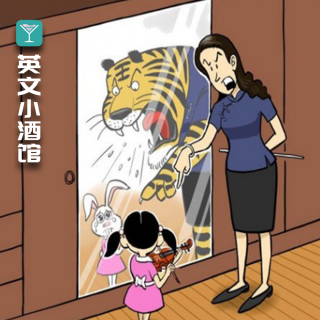人人都是播客
打开APP

14分钟

《闲话英伦》-心态崩了斗志起了,哎,我都觉得自己好“鸡”啊。
324
0
2023-04-20
关注公众号和同名视频号【璐璐的英文小酒馆】,了解更多好文和资讯!
Hi, everyone and welcome back to Britain Under the Microscope. 欢迎回来《闲话英伦》. Hi, 安澜.
Hi, Lulu. Hi, everyone.
Can I propose a topic actually?
Yeah, of course.
Alan, you speak very good Chinese. Have you ever heard of the idea of 鸡娃?
Yes...
You don't sound very sure.
I've heard of it, but it's one of those concepts that I don't think really translates into English. So if you're gonna ask me for an English translation of 鸡娃, then I probably would struggle a little bit.
It's basically like motivate your kids but like, forcefully.
Forcefully motivates your children. Okay. I'm not sure that's the particularly good translation, but I think that pretty much is what it is, isn't it?
I would say probably if we have to really translate it, I would go with the idea of a tiger mom.
Tiger mom, the sort of Asian parenting, is that not the stereotype?
It is a bit of a stereotype, but to be honest, I've lived in the UK and I've lived in China for quite some time now. I think that's a stereotype that is quite accurate in many cases.
But the thing is the whole Asian parents, especially Chinese parents, put a lot of effort, put a lot of emphasis on their kids, that kind of leads to somewhat of a misunderstanding. Sometimes our listeners would ask us, do English parents not care about their kids education, just let them run around wild?
I know. I have heard some of our fans and also some of my friends have said what does this mean? Does this mean that British parents don't care about their children, is that...? No, it's a completely different mindset.
I tell you why I would like to talk about this whole鸡娃 or parents attitude towards education in the UK, because last time I went back to the UK I was with some friends, and one of them has got a school age child whose... I say school age, this kid is about to go to college and start all that. And then you could see when family friends, when they are visiting when if they have a kid of similar age or slightly older, that's what they're gonna talk about. They're not gonna talk about holiday la, la, la. No, they're gonna talk about kids education, university application. Do you have extra credits? Do you have all of that?
Of course. That's the same for my family as well because from the sounds of it, my niece is the same age as your friend's child. And we constantly talk about university, we constantly talk about school. But it's from a very different standpoint. It's not that we don't care. I would say it's that we worry about slightly different things.
And in today's episode we're gonna explore that a little bit.
Yes.
But let's have the general tone is parents are parents no matter which culture which country they're from or they're in, they care about their kids education.
Of course, and probably a bit of disclaimer as well. Now I don't have any children and I know that you don't have any children, Lulu. So we're not experts, we're not gonna tell you how to raise your child. If you wanna listen to that, there's millions of those podcast all over the world in English and Chinese and Swahili. Every single language has those podcast has those videos. But what we're doing today is just giving you a little bit of our own personal opinion because we been in education for a number of years now.
And also being in the two cultures that we can somewhat compare what we have seen and observed.
First of all, let's talk a little bit about secondary education system, 就是整个中学的学制.
In England, it's a bit different, so for us is very straightforward. We have primary education which is age 6-12 and then 12-15, it’s junior middle school 初中, and then 15-18 is senior, the high school, and then university. In the UK it's not so.
It's a little bit different. Partly because England and Wales they have a different education system than Scotland, for example. But just to give you the quick lowdown, you have primary school which is 6-11 or 12, then you have secondary school which
评论
暂时没有评论,快下载荔枝app抢沙发吧!
00:00
14:27